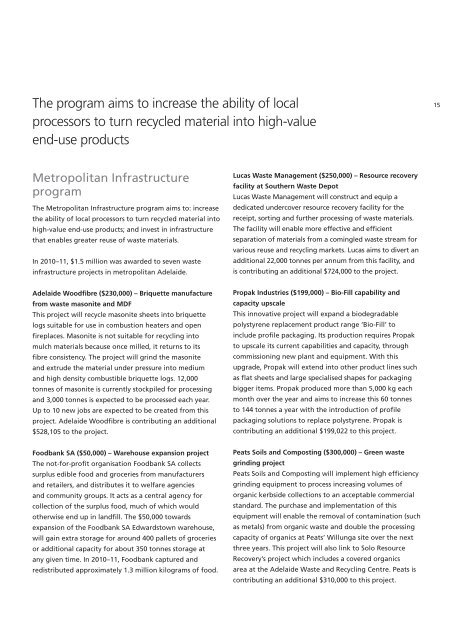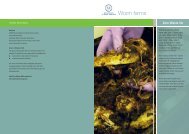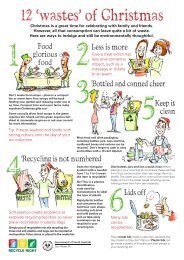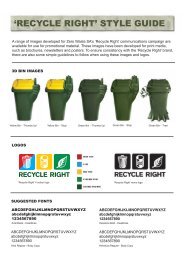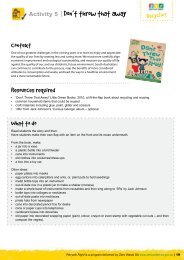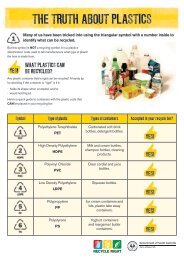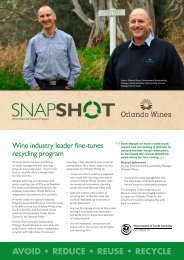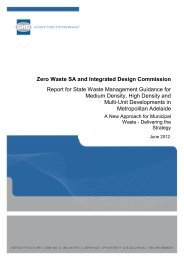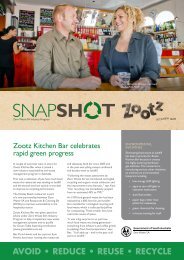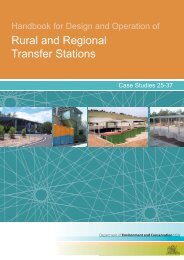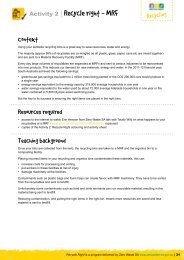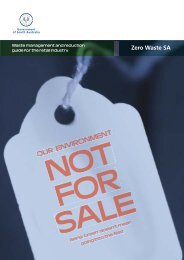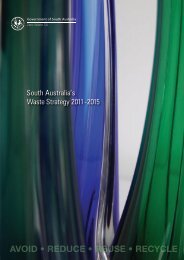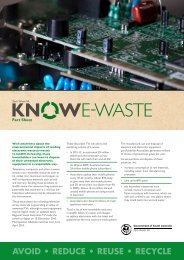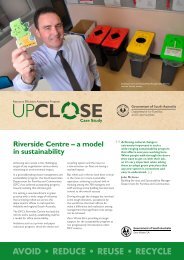Annual Report 2010-11 - Zero Waste SA - SA.Gov.au
Annual Report 2010-11 - Zero Waste SA - SA.Gov.au
Annual Report 2010-11 - Zero Waste SA - SA.Gov.au
You also want an ePaper? Increase the reach of your titles
YUMPU automatically turns print PDFs into web optimized ePapers that Google loves.
The program aims to increase the ability of local<br />
processors to turn recycled material into high-value<br />
end-use products<br />
15<br />
Metropolitan Infrastructure<br />
program<br />
The Metropolitan Infrastructure program aims to: increase<br />
the ability of local processors to turn recycled material into<br />
high-value end-use products; and invest in infrastructure<br />
that enables greater reuse of waste materials.<br />
In <strong>2010</strong>–<strong>11</strong>, $1.5 million was awarded to seven waste<br />
infrastructure projects in metropolitan Adelaide.<br />
Lucas <strong>Waste</strong> Management ($250,000) – Resource recovery<br />
facility at Southern <strong>Waste</strong> Depot<br />
Lucas <strong>Waste</strong> Management will construct and equip a<br />
dedicated undercover resource recovery facility for the<br />
receipt, sorting and further processing of waste materials.<br />
The facility will enable more effective and efficient<br />
separation of materials from a comingled waste stream for<br />
various reuse and recycling markets. Lucas aims to divert an<br />
additional 22,000 tonnes per annum from this facility, and<br />
is contributing an additional $724,000 to the project.<br />
Adelaide Woodfibre ($230,000) – Briquette manufacture<br />
from waste masonite and MDF<br />
This project will recycle masonite sheets into briquette<br />
logs suitable for use in combustion heaters and open<br />
fireplaces. Masonite is not suitable for recycling into<br />
mulch materials bec<strong>au</strong>se once milled, it returns to its<br />
fibre consistency. The project will grind the masonite<br />
and extrude the material under pressure into medium<br />
and high density combustible briquette logs. 12,000<br />
tonnes of masonite is currently stockpiled for processing<br />
and 3,000 tonnes is expected to be processed each year.<br />
Up to 10 new jobs are expected to be created from this<br />
project. Adelaide Woodfibre is contributing an additional<br />
$528,105 to the project.<br />
Propak Industries ($199,000) – Bio-Fill capability and<br />
capacity upscale<br />
This innovative project will expand a biodegradable<br />
polystyrene replacement product range ‘Bio-Fill’ to<br />
include profile packaging. Its production requires Propak<br />
to upscale its current capabilities and capacity, through<br />
commissioning new plant and equipment. With this<br />
upgrade, Propak will extend into other product lines such<br />
as flat sheets and large specialised shapes for packaging<br />
bigger items. Propak produced more than 5,000 kg each<br />
month over the year and aims to increase this 60 tonnes<br />
to 144 tonnes a year with the introduction of profile<br />
packaging solutions to replace polystyrene. Propak is<br />
contributing an additional $199,022 to this project.<br />
Foodbank <strong>SA</strong> ($50,000) – Warehouse expansion project<br />
The not-for-profit organisation Foodbank <strong>SA</strong> collects<br />
surplus edible food and groceries from manufacturers<br />
and retailers, and distributes it to welfare agencies<br />
and community groups. It acts as a central agency for<br />
collection of the surplus food, much of which would<br />
otherwise end up in landfill. The $50,000 towards<br />
expansion of the Foodbank <strong>SA</strong> Edwardstown warehouse,<br />
will gain extra storage for around 400 pallets of groceries<br />
or additional capacity for about 350 tonnes storage at<br />
any given time. In <strong>2010</strong>–<strong>11</strong>, Foodbank captured and<br />
redistributed approximately 1.3 million kilograms of food.<br />
Peats Soils and Composting ($300,000) – Green waste<br />
grinding project<br />
Peats Soils and Composting will implement high efficiency<br />
grinding equipment to process increasing volumes of<br />
organic kerbside collections to an acceptable commercial<br />
standard. The purchase and implementation of this<br />
equipment will enable the removal of contamination (such<br />
as metals) from organic waste and double the processing<br />
capacity of organics at Peats’ Willunga site over the next<br />
three years. This project will also link to Solo Resource<br />
Recovery’s project which includes a covered organics<br />
area at the Adelaide <strong>Waste</strong> and Recycling Centre. Peats is<br />
contributing an additional $310,000 to this project.


